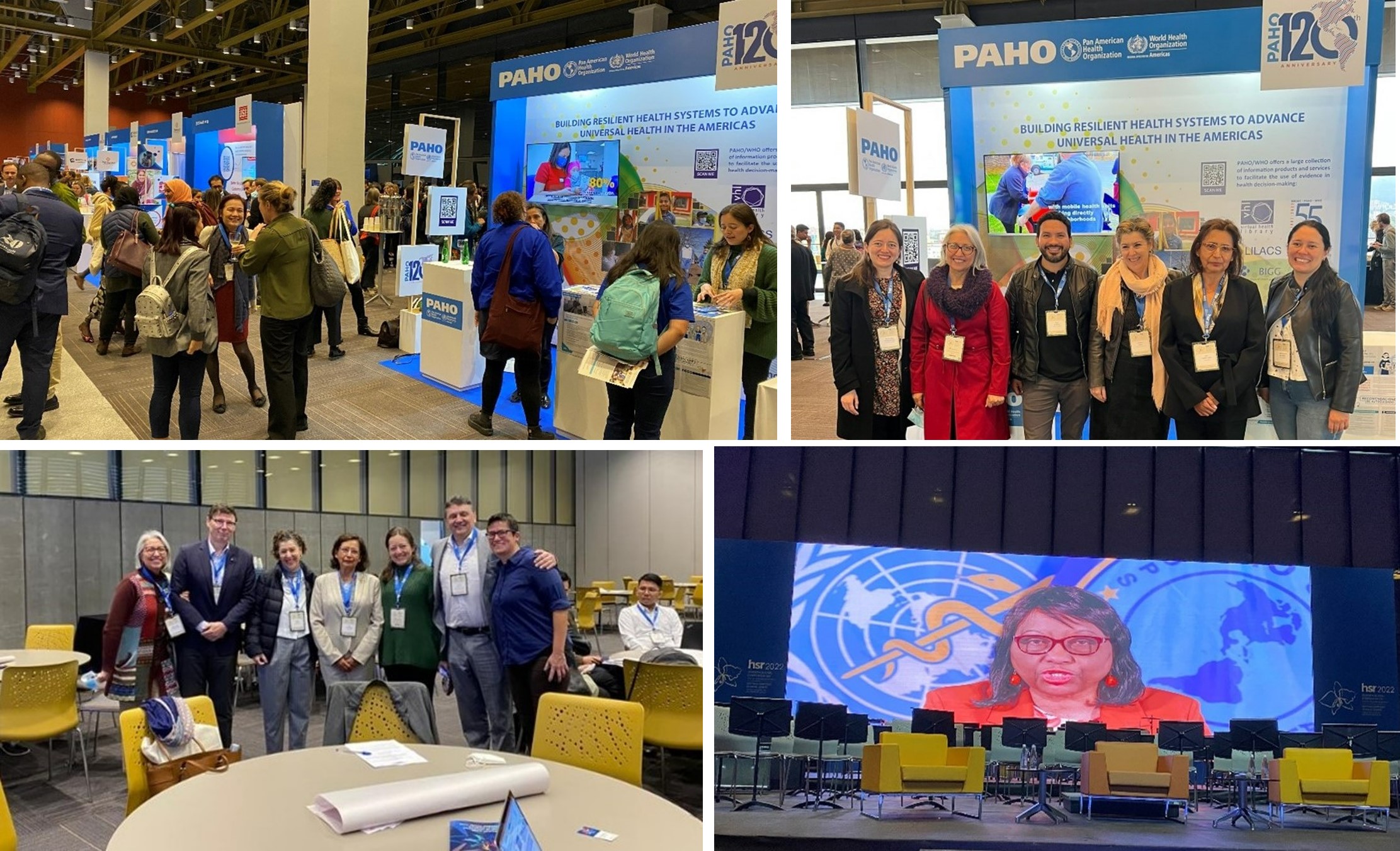Celebrating 120 years of solidarity in advancing the health and well-being of populations, leaving no one behind, the Pan American Health Organization/World Health Organization (PAHO/WHO) actively participated in the 7th Global Symposium on Health Systems Research (HSR2022), held in Bogotá, Colombia, from October 31 to November 4.
At the opening of the symposium, the Director of PAHO/WHO, Dr. Carissa F. Etienne highlighted the importance of joining forces to transform health systems, achieve Universal Health and improve human security. “We have important work to do through conferences like this one to reposition the value of science in our societies and strengthen institutional mechanisms that assess scientific evidence to guide policy making and future public health actions,” said Dr. Etienne on video, emphasizing that this means greater collaboration between governments and the scientific communities, increasing promotion and investment in health systems evaluation and performance, and the adoption of research results by policymakers.
In this sense, PAHO, in collaboration with BIREME, set up a booth at the event to promote the collection of information products and services that facilitate the use of evidence in decision-making in health, contributing to building resilient health systems for the advancement of Universal Health in the Americas.
In addition to working at the stand, BIREME’s representative at the event, Verônica Abdala, Information Sources Manager, participated in several event sessions focused on health systems research topics and evidence for decision-making in the Latin American and Caribbean Region (LA&C). The following presentations stand out:
– Based on the analysis of abstracts submitted to the HSR pre-conferences, the main thematic axes of research in health systems in LA&C were identified. In this analysis, it was evident that there were few articles on LA&C health systems in scientific journals, due to the difficulty in transcribing experiences in an appropriate article format and in the English language. Furthermore, most studies are narratives.
– Analysis of LA&C publications on COVID-19 showed a lack of collaborative research across countries and regions, despite an increase in institutional development for health research in the region, but generally uncoordinated and disaggregated.
– Little regional exposure to global knowledge in the area of health services and systems due to: (1) scarce financial resources to invest in research; (2) little incentive to publish in peer-reviewed journals and to develop unconventional literature (gray literature); (3) language barrier – researchers and decision makers do not speak English, and do not speak to each other and have little interaction with Caribbean colleagues.
– The need to deepen the professionalization of research in health systems and services (evaluation methodologies, case studies, impact assessments).

After five intense days and with many interactions with participants, the closing session of the event, coordinated by Gina Tambini, PAHO/WHO representative in Colombia, highlighted a proposal for a research agenda for health systems and services focused on primary health care to: establish governance for translating Social Determinants of Health (SDH) knowledge into action; and improve the research methods used for DSS assessment and analysis.
Promotion of information products and services to support decision-making in health
PAHO’s booth at the event was a space for the demonstration and dissemination of the main products developed by BIREME to support decision-makers in health, in addition to PAHO publications. It was also a meeting place for representatives of LA&C countries participating in the event.
A differentiating factor for the table was the organization and availability of all products, services, publications, and videos from PAHO and BIREME on a page of the Virtual Health Library (VHL), which also highlighted the event’s program with PAHO’s participation.
In addition to Verônica Abdala, from BIREME, the coordinator of the VHL Colombia, Ana Lorena, and the executive secretary of the VHL Traditional, Complementary and Integrative Medicines (MTCI), Natália Aldana, collaborated actively at the stand.
In order to capture the impression and user experience, two new BIREME products were promoted more prominently at the booth:
– Evid@Easy – new interface of the Guided Evidence Search Tool for SDG3 targets.
– BIGG and BIGG-REC – International Database of WHO and PAHO GRADE Guidelines and GRADE Recommendations
“It was an excellent opportunity to get to better know the context of health systems research and services in the region and guide BIREME’s actions, products, and services towards reducing the gap between scientific evidence and health management”, highlights Verônica Abdala.
Verônica Abdala is especially grateful to Gisele Almeida and América Valdes, both from the Organization’s Department of Health Systems and Services (HSS/PAHO), for inviting BIREME to participate and collaborate in such an important event, which resulted in a very productive event and an excellent opportunity to bring the VHL closer to health decision makers.